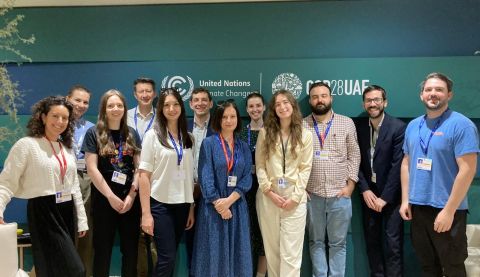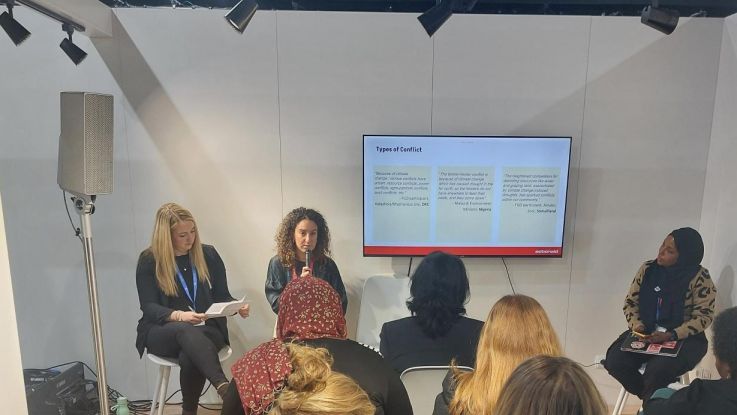What did COP28 achieve and where did it fail?
15 January 2024
This year’s UN Climate Change Conference, commonly referred to as COP, was attended by Zahra Hdidou, ActionAid UK’s Senior Climate and Resilience Advisor, in Dubai, United Arab Emirates. In this blog Zahra captures some of the ‘wins’ and some of the misses of COP28.

The CAN-UK team at COP28. Photo: ActionAid
Upon entering the venue “Expo City”, I was immediately impressed by its expansiveness, grand buildings and wide avenues. This proved to be immensely inconvenient when running between events and meetings in the hot Dubai sun.
Overhearing one architect stating that it was the least inclusive COP venue design she’d seen – countering the Presidency’s claim that this is the most inclusive COP ever – I wondered if they meant the admittance of a shocking record of 2,456 fossil fuel lobbyists. The Presidency was held by Sultan Al Jaber, chief executive of the UAE national oil, gas and fertiliser company, Adnoc, which caused a greater sense of distrust in the only process that governments have to collectively tackle the climate crisis.
Loss and Damage Fund
Civil society’s and much of the Global South’s wishes were granted on day one when the Loss and Damage Fund, agreed upon at COP27, was finally put into practice.
This Fund will provide financial support to countries most affected by the climate crisis and with the least resources to respond, to deal with the economic (livelihoods, homes, assets) and non-economic (loss of life, loss of cultural heritage sites, damage to mental health) losses and damages resulting from climate impacts.
For decades, ActionAid’s partners, along with global climate movements have relentlessly campaigned and advocated for climate justice. This Fund is recognition that those experiencing the worst impacts of the climate crisis are the least responsible for causing it, which is a huge accomplishment.
Next is for governments of high-income countries to act quickly to fill the fund.
This agreement was followed by a series of pledges from Global North countries, however, these fell drastically short in the billions. While the UK made a pledge to the Fund, this pledge was not new or additional money but was in fact a cruel reshuffling of money from existing Official Development Assistance (ODA) and climate finance commitments. This is a serious shortcoming, as it does not recognise:
- the escalating impacts that countries are faced with
- that this requires more funds, and
- the UK’s historic responsibility for the climate crisis.
It also diverts much-needed funds from other development and climate priorities. This failure is especially frustrating given the overwhelming evidence1 that funds could easily be extracted via taxation of the fossil fuel industry’s profits and repurposing government fossil fuel subsidies.
And while the private sector is also responsible for the climate crisis and should pay into the Loss and Damage Fund, the focus instead was stubbornly on the ‘mobilisation’ of private sector finance, meaning more loans instead of grants, putting the Global South into further debt and reducing accountability to communities.
Despite civil society’s best efforts to demonstrate the unsuitability of the World Bank as the Loss and Damage Fund host – given the Bank’s continued negative impacts on communities, high fee rates and their urgent need for decolonisation and reform – the Bank was still chosen as host, as long as it meets conditions set out by the UNFCCC.
Meanwhile, it was decided that the United Nations Office for Disaster Risk Reduction (UNDRR) is to host the Santiago Network for Loss and Damage, which is the technical advisory arm of the Fund. This was considered a win for us as the UNDRR already has expertise in addressing Loss and Damage and can bring appropriate support to affected communities.
Global Goal on Adaptation
For Global South countries impacted by climate change, ensuring climate adaptation and resilience is a matter of life and death.
Adaptation funding – including support for resilience building practices such as agroecology – has fallen drastically short, leaving those countries most affected by climate impacts less prepared and less resilient when shocks hit with increasing frequency and intensity.
This in turn leads to greater losses and damages. Therefore, when the Global Goal on Adaptation (GGA) started to lose momentum at COP28, civil society actions stepped up. We demanded specific, time-bound targets and financial commitments linked to the GGA, but unfortunately what we got was vague language and no cash commitments.
The hope is that next year the funds will be determined within the negotiations on the New Collective Quantified Goal, which will be the umbrella financial commitment for all climate finance, including mitigation, adaptation, and loss and damage. The fact that Global South countries cannot wait any longer, tragically, did not seem to have got through at COP.
The Fossil Fuel agreement
The much-awaited fossil fuel negotiations seemed to start off strong with language around the “phase out of fossil fuels”, but this language was gradually watered down and greenwashing took over with the focus on carbon capture and storage.
The final agreement failed even to commit to a full phase-out of coal, the most polluting of all fossil fuels. The agreement was so weak because Global North countries refused commit financial support to the Global South, who are willing to transition to renewables but don’t have the means to fund this transition and are still heavily dependent on fossil fuels.
Conversely, highly polluting countries have the means but choose to continue to funnel trillions of dollars into the fossil fuel industry. The leading example is the hypocrisy of UK Prime Minister Rishi Sunak’s approval of hundreds of new oil and gas licenses in the North Sea with disastrous impacts on the climate for years to come, and how this undermined the UK’s role and influence at COP28.
It can’t be denied that the agreement to transition away from fossil fuels is an historic one. And while it doesn’t have strong commitments at this stage and relies too heavily on unproven technologies, it does still send an important signal to the world that this is the beginning of the end of the fossil era.
We hope in particular that investors and the financial sector are listening – they will do well to shift their focus sooner rather than later, for their own benefit.
Looking ahead, COP will be hosted in Baku, Azerbaijan, where decisions will be made on how to make the transition away from fossil fuels a reality through finance, and where there will be a big role for all financial players to contribute.
Footnotes
- 1https://www.oxfam.org.uk/media/press-releases/fair-taxes-on-the-uks-biggest-polluters-could-have-raised-up-to-23bn-last-year-to-combat-the-climate-crisis/ https://www.ox.ac.uk/news/2023-01-12-climate-goals-can-be-achieved-affordable-cost-if-fossil-fuel-producers-pay-carbon



